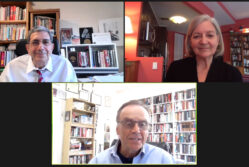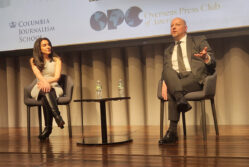
Schiffrin Digs Up Pivotal Stories in ‘Global Muckraking’
In Global Muckraking, Anya Schiffrin gathered investigative journalism from far-flung corners into an anthology that spans more than a century of vital reporting.
Schiffrin, the director of the media and communications specialization at Columbia University’s School of International Affairs, searched dusty archives and moldering newsprint to collect 47 pieces dating as far back as the 1880s. She then invited 40 journalists, experts, activists and academics to introduce the stories and place them in context.
She discussed the project with OPC guests during a book night in the dining room of Club Quarters on Dec. 1.
The anthology covers a vast array of muckraking topics, including death squads, trafficking, police brutality, abuse of women, anti-colonial movements, corruption and famine.
Many of the introductory essays in Global Muckraking explore how much impact individual stories or campaigns have after publication. She said some sparked critical change and reform, while others never seem to gain ground.
“Clearly there has to be a lot of journalism on one subject. One story doesn’t make a difference. There have to be other groups of society that really want to change something,” she said.
Photos of starving children in Bengal that were published in 1943, for example, caused public outcry and pressured Western nations to deliver food aid. On the other hand, Gareth Jones’s reporting on famine in Russia in the early 1930s didn’t cause much reaction abroad, likely due to geopolitical barriers.
“Information alone is not enough. If there are huge economic and political forces stopping change, information doesn’t necessarily do much.”
She said beginning with the earliest investigative reports, she found a strong relationship between activists and journalists, and the boundary between them was often fuzzy.
In 1904, E.D. Morel published a seminal book detailing brutality in the Belgian Congo called King Leopold’s Ghost, which set in motion what Schiffrin called the “first modern human rights campaign.” Morel launched a newspaper, funded in part by companies profiting from exploitation, and exposed conditions that sparked shareholder outrage and lawsuits.
Robert Friedman of Bloomberg News moderated the discussion. He contributed an introduction in the book to a piece he edited for Fortune magazine, “Chocolate’s Bittersweet Economy,” about child labor and other human rights violations on plantations in West Africa. The piece was a follow up to reporting six years earlier that had exposed terrible working conditions.
But when Friedman sent Christian Parenti to the Ivory Coast to check on progress, he found that not much had changed.
“The advocacy programs that had been set up monitor labor conditions never really got traction,” he said. “There were 8-year old kids who were spending their days picking and cracking open cocoa beans. It was pretty depressing.”
He asked Schiffrin whether any lessons could be drawn from success stories in the book.
She said cross-border collaborations between foreign and local reporters often help to amplify stories with better shock value abroad.
“Often it’s the outsider who doesn’t have the problems of access journalism, isn’t beholden to the sources, who can take the story and keep hammering on and on.”
Schiffrin said during her research it struck her that the majority of the newspapers and magazines she was poring over no longer exist. The good news, she added, is that the papers had gone but the journalism survived.
She said many small publications with investigative desks are currently popping up around the world, funded not by advertising or subscriptions, but by wealthy individuals who believe in good journalism.
“History has taught us that these outlets may not last, but right now there’s lot of journalism that’s being underwritten by philanthropists,” she said.
Minky Worden, the director of global initiatives for Human Rights Watch, said for advocates and human rights campaigners, the timing of reports and investigations is critical.
“You use all the tools that you have at the time you have them,” she said. “In a way the professions have merged and now campaigners must think like editors.”
Worden asked Schiffrin if information overload made it harder for people to spend their attention “bandwidth” on long-form investigative journalism.
“We have to believe that changing the conversation can lead to changes,” Schiffrin said. “And what journalists can do is change the conversation.”



